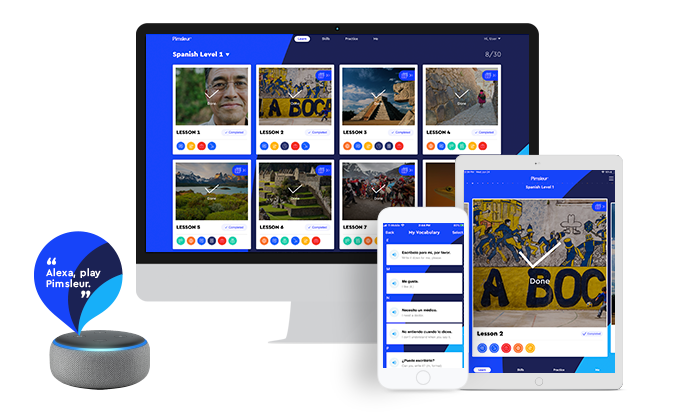
Fail Your Way to Success: The 5 Best—and Worst—Language Mistakes to Make
Why You Need to Make Mistakes to Learn a Language
Making Language Mistakes Can be Painful
I’ve lived in Brazil for over a year now, and I still feel embarrassed when I forget how to say, “It was nice to meet you.” in Portuguese. I regularly try to tell stories to my friends and find that no one understands. There’s a real shame when you tell a joke and no one gets it.
I find myself apologizing to strangers (“I’m sorry, I’m still learning!”) or thanking them for their patience. I often joke that I lose about 30 IQ points in Portuguese and that Estou engraçado em inglês—prometo! (“I’m funny in English—I promise!”)
When we learn a language, we’re constantly confronted by how much we don’t know. The discomfort of making mistakes is, I think, one of the reasons so many students give up learning a language: they want to be perfect from day one.
That desire to be perfect doesn’t help us. Many factors make great language learners, but it turns out a big one is the willingness to make mistakes. There’s a bunch of research on this: mistakes actually make us smarter.
But only certain kinds of mistakes. Others can hold you back from learning successfully.
In this article, I’ll explain which is which: the language mistakes you should make that will supercharge your learning and the ones you should avoid at all costs.

5 Language Mistakes You Absolutely Should Make
1. Grammar Mistakes
Grammar mistakes are good.
Why?
Well, first, you make grammar mistakes when you’re using a language—when you’re speaking or writing. Making grammar mistakes is a sign that you’re actually practicing. That practice will ultimately lead to better language use and, eventually, fewer grammatical errors.
Second, evidence shows that we internalize learning better when we get it wrong the first time. So mistakes actually make learning more efficient.
Finally, remember that the point of learning a language is to communicate. If you can communicate with someone in a second language, you’re winning—even if you’re making a bunch of mistakes. Don’t worry so much about grammar. It will come with time.
2. Speaking Poorly
No matter which language you are learning—from learning your mother tongue as a baby to speaking a second, third, or fourth language—you will begin speaking poorly. We all start at the beginning.
The key is to keep practicing.
Practice will give you the self-confidence to communicate better and more naturally without so many pauses or searching for words.
Imagine you’re a scientist. When scientists make mistakes, they often learn something new and useful. That’s why science writer Adam Frank says mistakes are “the essence of scientific heroism“.
So, speak poorly: use the wrong words, have bad pronunciation, and use the wrong tones. But keep speaking. That’s how you’ll learn and get better.
3. Have an Accent
Depending on the language you are learning, the accent of your native language may cause you to pronounce certain words in a way that is quite different from native speakers.
For example, I can’t pronounce the “r” in Portuguese. Or in French. Or in Spanish. My mouth just doesn’t move like that.
But that’s okay. Your accent tells a lot about your history, culture, and roots. Why speak like a Parisian if you were never born or raised in Paris? Sure, you want people to understand you. But you don’t need to “lose” your accent.
Work on your pronunciation so that you can speak clearly, but don’t spend much time worrying about your accent. Spoiler alert: everyone has an accent.
4. Feel Silly in Front of Strangers
In my experience, you will feel at least a bit silly roughly 90% of the time you are speaking another language. That’s just how it works.
But the truth is that no one is judging you. Everyone knows that learning a language is difficult. You are much more likely to arouse empathy than judgment.
Lean into that feeling of discomfort. It’s good. It shows you’re getting outside your comfort zone and that’s how you grow.
And if you’re really bothered by feeling silly in front of strangers, you can just take your language practice online. Apps like HelloTalk, HelloPal, and Tandem can help you find a virtual conversation partner.
And the best thing about language exchange? You get to speak half in your native tongue. So you get to feel silly half the time, and then it’s your partner’s turn to feel silly. It balances out!
5. Find the Wrong Study Methods
Testing out and experimenting with different study methods will help you find one that actually is a great fit for your needs and goals.
We’re all different. A method that works for hundreds of others may not be the best for you. You will only discover what works best for you through trial and error.
If you’re looking for a method focusing on organic, fast, and targeted learning, try the Pimsleur method. You may find that it is exactly what you were looking for. You can get your Free 7-day Trial with unlimited access to all levels in the language of your choice.
5 Worst Language Mistakes You Can Make
1. Not Making a Plan
You won’t accomplish your language goals if you don’t have a direction or plan. As a language teacher, I’ve consistently seen that the most successful students are those who have developed a language learning strategy.
So don’t just wing it. Instead, create an at-home language immersion program for yourself. Then keep track of your language progress and readjust as necessary.
2. Avoiding Conversation
I can’t emphasize enough the importance of practicing your language. Listening, reading, and writing are all great. But it’s very important to actually speak it with others, too.
You will only get good at speaking a language by actually speaking it.
Don’t be afraid to communicate. If in-person conversations are a bit intimidating, try online conversations. (Our tips for a successful online language exchange may be useful to you).
3. Doing Boring Activities
Your study can get boring when you get too attached to grammar exercises, vocabulary lists, or language books. What happens then? Your attention may drift, and eventually, you may spend less actual time learning the language.
The secret to learning a language is to find activities you love to do. These are things you would enjoy doing even if you don’t really understand the language.
You can make anything a language activity: watching TV shows on Netflix (with subtitles in the language you’re learning), listening to podcasts, watching TV, listening to music, cooking, or even video games.
The key is to learn how to build language learning into your routine with activities you want to do. Doing things you love will motivate you to continue—even when it’s hard.
4. Relying on a Teacher
It’s true that a good language class or tutor can greatly improve learning performance, but that doesn’t mean you should rely on your teacher to learn a language.
“Learning” is an active verb—it’s you who does the learning. And ultimately, it’s you who will become fluent or not.
Don’t be a passive language learner, and don’t over-rely on your language classes or tutor. Doing so will really limit your success.
5. Not Giving Yourself Enough Time
Learning a language takes time. According to the US Foreign Service Institute, it can take up to 750 hours to achieve fluency in languages that are similar to English like Danish and Dutch. It can take much longer for languages that are very dissimilar to English—Japanese can take up to 2,200 hours of study and practice.
If you really focus, learning a language in a year is realistic. But you’ll have to engage with your language for at least an hour a day to do that.
That seems like a lot of time—and it is—but part of the reason that learning a language is so rewarding. You have to invest in it.
So give yourself enough time. Build sufficient time for language learning into your plan and schedule.
Learn to Love Your Language Mistakes
Accept that you’ll make language mistakes if you truly want to speak a new language. Lots of them. Thinking you have to be perfect is one of the myths that actually can get in the way of your learning.
Remember that your mistakes show you’re growing. Learning becomes an achievement rather than a burden when we see our mistakes as signs of progress. And we become kinder to ourselves, which helps us persevere.
Real growth is impossible without effort, discomfort, sweat, and perhaps even tears.
So lean into them. Rather than avoid mistakes, actively try to make them. And then notice how much your language improves.
Learn a Language With Pimsleur
Pimsleur is designed to be integrated into your daily life – you don’t have to go searching for those extra 30 minutes per day… This means that you could be speaking a new language 30 days from now just by washing the dishes… or walking the dog… or going for a run! You get immediate access to your lessons, and with our 30-day money-back guarantee, you can start learning with total peace of mind.
Try a free week of our proven Pimsleur method.
Or test-drive a Free Lesson right now!

2 Comments for "Fail Your Way to Success: The 5 Best—and Worst—Language Mistakes to Make"
Oh, I am sure that I have made all these mistakes which are considered good: I made and continue to make grammar mistakes, seem silly in front of strangers, and tried different learning methods.
But I am also often afraid to talk to people and practice the language and rarely have a step-by-step plan. I understand that this slows me down on the way of language learning and now I try to do everything right.